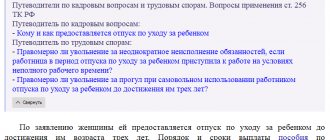Guardians take on significant responsibility for their wards, support them and represent their interests (of course, if the guardianship procedure was carried out correctly).
According to the legislation of the Russian Federation, guardians are entitled to certain benefits, for example, tax or labor benefits. Benefits can be in monetary form or in the form of exemption from any responsibilities. Guardians of minors and incapacitated citizens can apply for them.
Read the article about the types of benefits entitled to a guardian and the rules for registering social privileges.
Labor benefits
When registering guardianship over minors, guardians are entitled to labor benefits. This type of benefits is equivalent to the established privileges for employees with children. They include benefits regarding vacations and working hours.
Benefits in connection with the provision of vacation:
- leave to care for a child under 3 years old;
- leave in case of illness of the ward;
- additional unpaid leave of up to 14 days every year if the ward is under 14 years of age;
- annual paid leave in full or part of it, if the ward goes to study in another locality and the guardian will accompany him upon admission;
- if the ward is disabled: annual paid leave at any time. 4 additional paid days off per month.
Benefits related to working hours:
- Part-time/week if the ward is under 14 years of age;
- If the ward is under 5 years old, the opportunity to refuse:
- night work;
- working overtime;
- working on weekends and holidays;
- business trips.
Tax privileges
Guardians also have the right to receive tax benefits in connection with their status - standard, property and social tax deductions.
The standard tax deduction means that the 13% income tax is not levied on the specified amount of wages. If a minor has two guardians, the deduction is divided in half.
For 2021, the amount of income tax will be:
- For the first and second ward - 1,400 rubles.
- For the third and further – 3000 rubles.
- For a disabled child – 6,000 rubles.
Social tax deductions:
- payment for full-time education of the ward - no more than 50 thousand rubles per year per ward;
- payment for treatment and/or medications for the ward - no more than 120 thousand rubles.
Property tax deduction is calculated in the event of concluding transactions for the acquisition of land plots for the construction of housing or finished housing in the ownership of the ward.
To receive a social deduction, the applicant must attach to the declaration to the tax office a package of documents that confirms the relevant expenses in the accounting year.
Sample declaration
Benefits when paying for utilities
Benefits for utility bills are established from the date of establishment of guardianship, if the guardian submitted a corresponding application within 6 months. If the application is submitted later - 6 months prior to filing the application.
These benefits are assigned to pay for housing, utilities, and telephone services in the place where the child actually lives. The amount of benefits differs depending on the region of the Russian Federation. Payment for services is made at the place of residence of the guardian and the ward.
To apply for benefits for utility bills, you must write an application to the territorial social security office and attach to it:
- birth certificate of the ward;
- a document confirming the establishment of guardianship;
- certificate of the child’s place of residence;
- certificate of joint residence of the ward and guardian, issued by housing authorities.
Housing
Orphans, children left without parental care and persons from among them have the right to specialized housing in which they can settle after graduating from a special institution, such as a boarding house.
Housing is provided under a special agreement - a rental agreement for specialized residential premises. It is valid for five years. But it can be extended for another five years or converted to a social tenancy agreement. Housing under a social rental agreement can over time be privatized, rented out, exchanged or sold. You can privatize housing five years after concluding a social tenancy agreement. To do this, you need to write a statement to the administration. The decision will be made within two months.
The size of housing provided depends on the established living space standards in the region. For example, in the Samara region the norm for living space per person is 33 m². In Moscow - 18 m². Accordingly, the orphan will receive a separate apartment or house of approximately the same area or more.
Space standards in your region can be found in the regulations on housing rental under social tenancy agreements or special laws on the provision of housing for orphans.
Registration procedure. To obtain housing under a rental agreement for specialized residential premises, an orphan needs to register with a special person. You can apply for it from the age of 14 to 23, but it is better to do it immediately after receiving your passport.
To do this, you need to submit an application to be included in the list of children who must be provided with living quarters. For orphans under 18 years of age, it is submitted by the administration of a special institution (boarding home), a trustee or guardian. An orphan 18 years of age or older submits an application independently to the local administration directly or through the MFC.
The list of required documents is determined by the region that provides housing for the orphan. Here is a sample list of documents:
- Statement.
- A copy of the birth certificate.
- Copy of Russian passport.
- A copy of the social tenancy agreement for residential premises or other documents confirming the right to use residential premises on the terms of social tenancy (if any).
- A copy of a document confirming the authority of the legal representative.
- A copy of a document confirming the absence or loss of parental or single parent care.
- Documents confirming the impossibility of living in previously occupied residential premises, issued in the manner established by the legislation of the constituent entity of the Russian Federation.
- A copy of the power of attorney, if the documents are submitted by a representative.
You will need original documents so that the inspector accepting the documents can be convinced of their authenticity.
Preferences in the field of education
Benefits for a guardian of a minor child in the field of education are:
- For kindergarten - a discount of 50%, in some regions - 100%.
- For schools - free meals 2 times a day and free textbooks.
- Some institutions offer free preparation for entering school, technical school, and university.
Children under guardianship have the primary right to enter kindergarten - for this they must provide a certificate from the guardianship and trusteeship authorities on the establishment of guardianship.
Regional benefits
Many types of benefits for guardians are established not only at the federal level, but also by each region independently. Full information about them can be provided by the social protection office at your place of residence.
In Moscow, for example, the following are installed:
- 50% discount on preschool fees;
- free travel in public transport - except taxis and minibuses;
- free baby food and medicine for children under 3 years of age;
- free visits to museums and parks.
There are other benefits in St. Petersburg, for example:
- compensation of expenses in the amount of 100% for housing and communal services;
- compensation for the purchase of clothing, books and equipment;
- free trip to a sanatorium for a child;
- monthly maintenance payments.
In the Orenburg region we can highlight:
- free school uniform;
- gifts for wards for New Year and Christmas;
- free medicines for children under 6 years of age;
- admission to kindergarten out of turn.
Payment terms
The timing of payment of benefits to guardians and their wards is determined by the local branch of the Pension Fund. Tax deductions are provided as needed and within the time limits established by the Tax Code of the Russian Federation. In recent years, the right to free travel on public transport has been distributed through plastic transport cards, which must be renewed annually.
Benefits for utilities are received upon request and by submitting documents to the social protection department. These papers must be submitted again every six months.
Sources
- https://zen.yandex.ru/media/opekarf/kakie-lgoty-polojeny-opekunam-nalogovye-trudovye-medicinskie-5d02702c789be400afc05355
- https://semeinoe-pravo.net/lgoty-opekunam-nesovershennoletnih-detej/
- https://SocPrav.ru/lgoty-opekunam
- https://littleone.com/publication/0-6869-lgoty-opekunam-nesovershennoletnih-detey-v-2020-godu
- https://www.mos.ru/otvet-socialnaya-podderjka/kak-poluchit-vyplaty-usynovitelyam-opekunam-priemnym-roditelyam/
- https://law-divorce.ru/lgoty-opekunam-nesovershennoletnih-detej/
- https://allo-urist.com/lgoty-opekunam-nesovershennoletnih-detej/
- https://journal.tinkoff.ru/guide/benefits-to-orphans/
- https://pravoved.ru/themes/%D0%BB%D1%8C%D0%B3%D0%BE%D1%82%D1%8B-%D0%BE%D0%BF%D0%B5%D0% BA%D1%83%D0%BD%D0%B0%D0%BC/
Are there any benefits for guardians of incapacitated persons?
Disabled people of groups I and II who are declared legally incompetent are also appointed a guardian. A guardian, an able-bodied but unemployed person caring for a ward, is entitled to compensation payments.
The amount depends on the region and is paid simultaneously with the pension of the ward. Other benefits include:
- discount on utilities;
- free trip to the sanatorium - as an accompanying person;
- shortened hours at work;
- reduction of land tax and 100% compensation for housing tax;
- free travel on public transport;
- 4 additional paid days off per month;
- refusal to work on weekends and holidays, at night and overtime;
- 2 additional weeks of unpaid leave per year;
- early retirement.
The benefits of guardians of disabled children are almost identical to the benefits of guardians of adults with disabilities of groups I and II. In addition, they have the right to a standard tax deduction in the amount of 6 thousand rubles, a social tax deduction, and a priority right to receive land for gardening, personal farming or individual housing construction.
When are parents of a minor child entitled to leave?
If we talk about the maternity period, then you can use this right at any time. This period covers the time until the minor reaches 3 years of age. Every parent has the right to take advantage of the opportunity to get leave. They can change and take the period they need.
Parents with minors under 7 years of age have the right to receive rest at any time. That is, they can contact the employer with an application to provide them with such time as they deem necessary. And the employer must satisfy such a request.
Another preferential category is parents with children from 7 to 10 years old. This category of workers has the right to rest during the summer holidays. This is a significant guarantee. It allows you to get time off with your son or daughter every year.
This is important to know: Does a group 1 disabled person pay child support?
Providing leave for parents with disabled minor children
Employees raising disabled people are also provided with guarantees. They are entitled to enjoy the following benefits:
- they have the opportunity to choose their own time. They have the right to apply to their employer to take a vacation at any month;
- such employees may enjoy additional leave. It can be caused by a variety of reasons. The duration of this time is up to one month.
Thus, many guarantees and benefits have been established for this category of employees. In addition, they have other guarantees related to business trips and protection during staff reductions.
Additional leave for parents with minor children
This group should be divided into two categories. If education is carried out in relation to a disabled person, then the additional period will be up to one month. And they can write a corresponding application for additional leave in any month at their discretion.
When parents are raising a son or daughter under 12 years of age, they can also take advantage of the extra time. But in this case, the duration will be two weeks.
Similar
Today, some mothers of many children are confident that the Labor Code of the Russian Federation contains grounds in accordance with...
Every officially employed citizen, regardless of the form of ownership of the enterprise, has the right to rest. For…
All people who are under military status or serving in the Russian army have the right...
Every person who has not reached the age of majority has at least once thought about getting a job. Thankfully today...
There is Article 11 of the Federal Law, which contains the main provisions for providing basic and additional leave to military personnel.…
Obviously, maternity leave is a long period. Therefore, an employee can receive before going to...
How to apply?
The procedure for obtaining benefits for guardianship:
To receive social assistance, the guardian must submit a corresponding application to the guardianship and trusteeship authorities and attach to it:
- your passport;
- birth certificate of the ward;
- an extract from the decision of the guardianship authority on its establishment over the child;
- certificate from place of residence;
- certificate of the guardian's family composition.
A guardian of a disabled person of group I or II can submit an application to the territorial social protection authority or MFC at the place of residence in person or through an intermediary.
The following must be attached to the application:
- guardian's passport - original and copy;
- an extract from the decision of the guardianship authorities;
- a document certifying that the ward has a disability group - a copy;
- a copy of the cover page of the guardian's passbook, which displays bank details;
- a document confirming the joint residence of the guardian and ward.
Depending on the case, other documents may be needed. The period for making a decision on such issues is up to 30 days.
To apply for any of the above benefits separately, an application is submitted to the competent authority, to which in each case an extract of the decision of the guardianship and trusteeship authorities on the establishment of guardianship is attached.
If you have questions, consult a lawyer
You can ask your question in the form below, in the online consultant window at the bottom right of the screen, or call the numbers (24 hours a day, 7 days a week):
- +7
— Moscow and region; - +7
— St. Petersburg and region; - +7
— all regions of the Russian Federation.
www.samso.ru
People who care for other people's children, disabled and elderly citizens are entitled to certain social benefits. Guardians of children have the same privileges. And for those who care for incapacitated persons and the elderly - others. Benefits for guardians of minor children are administered by social protection authorities.
How to establish guardianship or trusteeship
Unlike the act of adoption, a corresponding court decision is not required to establish guardianship or trusteeship. All issues related to guardianship and trusteeship are dealt with by state guardianship and trusteeship authorities under local authorities. The activities of the above bodies are regulated by the Law of the Russian Federation “On Guardianship and Trusteeship”.
Attention! You can read the text of the document here.
The Law of the Russian Federation “On Guardianship and Trusteeship” regulates the activities of guardianship and trusteeship bodies.
Based on the requirements of this law, guardianship and trusteeship bodies (TCA) have the authority to:
- Protecting the interests of citizens who are unable to exercise their rights independently.
- Establishment of guardianship and trusteeship.
- Cancellation of guardianship and trusteeship.
- Maintaining records of persons in need of guardianship and trusteeship.
- Search for persons willing to take on the functions of a guardian or trustee.
- Supervision and control over the performance of guardians and trustees of their duties.
- Supervision over the safety of the property of those under guardianship.
- Issuance of adoption permits.
The following may apply for the role of guardian:
- Officially employed, capable men aged 18 to 60 years, who have no criminal record for crimes involving intentional harm to human life and health, and who do not have alcohol or other harmful addictions.
- Officially employed, capable women aged 18 to 55 years who meet the same requirements.
Who can become a guardian or trustee of a child Guardianship
is appointed in cases where there is a need to provide all forms of social protection in the interests of a child, an elderly person or a person declared incompetent by a court. The conditions for appointing guardianship will be:
- The child has no parents or the parents are unable to exercise their functions for any reason (illness, deprivation of parental rights, sentence to imprisonment, etc.).
- The inability of an elderly person to independently protect their interests due to physical weakness or illness.
- The impossibility of independently protecting one’s interests by a person declared incompetent by a court due to his mental illness.
In addition to the application, the guardianship and trusteeship authorities should provide a self-written autobiography and a package of documents, including:
- Identification documents of the applicant for the role of guardian.
- An application form of the established form, the form of which will be provided to the guardianship and trusteeship authority.
- A certificate from your place of employment, including information about your salary and characteristics.
- Certificate of housing status (or house register). It should be remembered that the guardianship and trusteeship authorities will necessarily check the living conditions of the future guardian and draw up a corresponding act about this, which will be attached to the materials of the guardianship case.
- Medical report on health status.
- Certificate of presence or absence of criminal record. In cases where there is a criminal record, the guardianship and trusteeship authorities will individually evaluate this information.
Video - What is guardianship and who can become a guardian
What is due to guardians and trustees?
There are two types of supervision for minors: guardianship and trusteeship. The key difference is the age category of the children in care. The first format is established for persons under 14 years of age, and the second for the period 14-18 years.
Art. 35 of the Civil Code of the Russian Federation states that the following persons cannot act as guardians of children:
- with family rights annulled at least once;
- under 18;
- with limitation of the psychophysical functionality of the body;
- incompetent.
Social benefits for child guardians may be as follows:
- One-time assistance provided - 15,512.65 rubles, provided in the absence of parents due to their death, disability, criminal record, or inability to raise a child for various reasons. Paid to guardians who take someone else's child into their family.
- A monthly payment allocated by the state as compensation for the expenses of trustees/guardians for the maintenance, upbringing, and education of the child under their care.
- A special reward for those who accept a minor child into their family. Appointed at the place of registration of the children under guardianship and depends on their number.
Important! Regional regulations may establish separate benefits and payments to guardians. Various subsidies are allowed. For example, to pay for housing and communal services, connection and use of the telephone. Download for viewing and printing:
Civil Procedure Code of the Russian Federation dated November 14, 2002 N 138-FZ (as amended on December 19, 2016) (as amended and supplemented, entered into force on January 1, 2017)
Guardianship or trusteeship
The legislation defines guardianship and trusteeship as forms of protecting the interests of persons who are unable to take care of themselves. At the same time, the division of these protection institutions is based on their target orientation. That is, they are aimed at different people.
Guardianship is assigned either to children under the age of 14 years, or to elderly people who, due to mental or physical ill health, need care and maintenance.
Guardianship is established for children over 14 years of age or for adults who are officially recognized as incompetent.
When providing social protection for children, the status of a guardian automatically changes to the status of a trustee as soon as the child reaches 14 years of age. The payments and additional payments required by law do not change and remain until the child reaches the age of majority, or the age of 23 in the case when the ward does not work due to full-time study at an educational institution. Differences between guardianship and trusteeship
Monthly fees for guardianship
Issues of types of benefits and payments due to guardians are regulated. They are recorded in Federal Law No. 81 dated May 19, 1995, as well as in Order of the Ministry of Health and Social Development of the Russian Federation No. 1012n dated December 23, 2009. The amounts of benefits for guardians in 2021 are established by the relevant resolutions of the Government of the Russian Federation.
Attention! Federal legislation leaves it to the regions to establish the amount of social benefits for guardians of minors.
It only establishes general principles for payments to guardians:
- for non-workers - 2,908.62 rubles. on the 1st, and 5,817.24 rubles. for the 2nd and subsequent children;
- for workers - 40% of the average wage, but not more than 23,120.66 rubles.
Payment terms
Benefit payment periods:
- One-time payments are issued if they are applied for no later than 6 months after the decision to establish guardianship is made. Assigned and paid within 10 days from the date of receipt of the application with the necessary package of documentation.
- Monthly payments are assigned if they are applied for no later than 6 months after the conclusion of an agreement to transfer the baby to a foster family. Paid for the entire period during which the guardian had rights to payment of benefits.
Download for viewing and printing:
Federal Law of May 19, 1995 N 81-FZ (as amended on March 28, 2017) “On state benefits for citizens with children”
Order of the Ministry of Health and Social Development of Russia dated December 23, 2009 N 1012n (as amended on May 4, 2016) “On approval of the procedure and conditions for the appointment and payment of state benefits to citizens with children”
Do you need expert advice on this issue? Describe your problem and our lawyers will contact you as soon as possible.
Regional payments
Regional regulations establish different amounts of benefits for supervised children. Financial allocations depend on the age category of the ward and the number of wards in the family.
For example, in Moscow, if a child has not reached the age of 12, and his parents were deprived of their family rights, he was left without adult support - due to their death or for another reason - the citizen who accepted him into his family is paid 15 thousand monthly. rub. When guarding a child aged 12-18 years, his adoptive parents are paid 20 thousand rubles. every month. If the number of children under care is more than 2, then an additional payment of 3 thousand rubles is made for each of them. Studying at a higher educational institution for a child under guardianship makes it possible to receive funding at the same level until the student turns 23 years old. But in this case, payments are reissued every six months. The presence of physical ailments in the child under care, confirmed by the status of a disabled person, increases the amount of payments to 25 thousand rubles.
Financial assistance provided to guardians/trustees is targeted. This money is not intended to satisfy the personal needs of guardians and does not act as some kind of reward for the social work they do .
In fact, all the money is intended to support the children in their care. Satisfying their household, school and other personal needs.
Cash payments to guardians
Guardianship benefits are established by the state and local authorities.
The right to receive state assistance from the state budget is enshrined in Art. 31 Federal Law “On guardianship and trusteeship”.
Types of financial assistance:
- one-time payment - a payment intended after the establishment of guardianship;
- monthly - funds from the budget aimed at meeting the needs of the person under care;
- specialized - benefits guaranteed to certain categories of citizens with a certain social status of the ward (for example, alimony).
Financial support provided to guardians is targeted and is not compensation for the fulfillment of social obligations.
Within a subject of the federation, separate guarantees for guardians may be established.
When guarding a minor child
Types of assistance Amount (thousand rubles) Conditions of provision
| One-time | 14,497 | Absence of parents | |
| Additional | Set individually by local authorities | ||
The amount of cash benefit depends on a number of factors:
- Region. The amount is affected by the SWP and PM at the place of residence.
- Inflation rate. Every year, the amount of financial assistance is indexed in accordance with the realities of the economic situation.
- Family circumstances:
- the large family;
- number of children in care.
- The child’s health status (presence of disability).
Therefore, it is necessary to clarify how much money the state allocates to guardians in a particular case.
In addition to the above benefits, a minor may qualify for additional financial support in the form of alimony from biological parents.
These funds must be spent on a child under guardianship:
- training and education;
- organization of everyday life;
- purchasing necessary things;
- other.
The powers of the guardianship authorities include checking the distribution of money. In case of irrational use of financial assistance, the guardian may lose monthly payments and lose his status.
Payment terms:
Type of compensation Period
| One-time | The applicant must apply no later than 6 months from the date of establishment of guardianship. Calculation and transfer of funds occurs within 10 days from the date of submission of the relevant application with the necessary documents. |
| Monthly | Simultaneously with the application for the appointment of guardianship |
When guarding an incapacitated person
Guardianship of an adult incompetent person is considered a gratuitous service. In some situations, the state guarantees cash payments.
In accordance with Decree of the Government of the Russian Federation dated June 4, 2007 No. 343, you can count on a monthly allowance if the guardian:
- able-bodied (14-55 years for women and up to 60 for men);
- there is no work and no other income;
- provides care for disabled people of group 1 (except since childhood).
Any citizen who provides care has the right to receive such funds, even if they do not have the status of a guardian and live separately.
The amount of monthly compensation is 1200 rubles. In certain regions, for example in the Far North, the amount increases by the regional coefficient.
Compensation is paid from the month the interested person submits an application and the necessary list of documents, but not earlier than the moment the right to such payment arises.
Amounts of benefits not received on time may be paid for the previous period, but no more than 3 years before the appointment.
When caring for a disabled person of groups 1.2
Decree of the President of the Russian Federation dated December 26, 2006 No. 1455 established monthly compensation payments to unemployed able-bodied guardians of disabled people:
- 1 group – 1200 rub.;
- children, disabled since childhood, group 1 – 10,000 rubles.
A citizen caring for a disabled person has the right to dispose of the benefits and benefits of the ward under the control of the guardianship authorities:
- pension;
- state material support: social services, free travel, compensation for treatment or vacation.
Funds must be directed to the needs of the person under guardianship.
When caring for an elderly person
Guardianship of the elderly is a voluntary and almost free activity. The main goal is to care for the old person. The monetary advantage of guardianship over an elderly person after 80 years of age involves a compensation payment of 1,200 rubles. No other benefits in this category are provided.
The procedure for applying for and receiving compensation complies with the general rules for processing state financial assistance.
Benefits upon retirement
According to the Federal Law “On Insurance Pensions”, guardians of disabled people from childhood are entitled to pension benefits, provided:
- registration of status and upbringing until the child reaches 8 years of age;
- Availability of insurance experience: man – at least 20 years, woman – 15.
Procedure for obtaining benefits
Payment processing Features Package of documents Consideration period
| Social Security Department | Visiting your place (region) of residence |
| 10 days |
| MFC | |||
| Official website of State Services |
|
The guardian or official representative has the right to appeal to the relevant authority through a notarized power of attorney.
Registration of benefits
Benefits for persons providing permanent care and caring for minor children are assigned legally and according to a certain algorithm.
Important! The starting point for the corresponding payments is the moment of filing an application for the appointment of guardianship in any of its forms.
The guardianship authority transmits the necessary information to the social security authorities, Social Insurance Fund, Pension Fund and other structures that are involved in the social security scheme for wards and their guardians.
The first stage of processing payments is collecting the required package of documents. Common ones among them:
- identification documents of the applicant and the ward - passports or birth certificates;
- details of the banking institution where the applicant has a current account;
- application of the guardian for the assignment of social benefits.
If the benefit must be paid to the person raising the child, the specified basic package also includes:
- decision to establish guardianship/trusteeship;
- current certificates about the ward’s completion of studies at a higher educational institution;
- documents confirming that the child has a disability;
- Documentary evidence of the cohabitation of the caregiver and the child.
Properly submitted documentation is processed by an authorized specialist. After the analysis, payments are assigned that meet the terms of the guardianship.
Social benefits
In addition to cash payments and benefits, the state provides guardians with benefits in the field of labor and taxation. In addition, separate benefits are provided for persons caring for disabled children.
Labor benefits
- Maternity leave is provided until the ward reaches 3 years of age (Article 13 of the Federal Law-81, Article 256 of the Labor Code of the Russian Federation);
- sick leave for a child under 7 years of age - for the entire period of illness, after 7 years - up to 15 days for each case of illness;
- the guardian has the right to part-time work or part-time work week (Article 93 of the Labor Code of the Russian Federation);
- do not work at night if there are children under 5 years of age (Article 96 of the Labor Code of the Russian Federation);
- the possibility of receiving 4 additional paid days off per month if the child under care has a disability (Article 262 of the Labor Code of the Russian Federation);
- annual paid leave, provided at his request and at a time convenient for him, if the ward has the status of a disabled person (Article 262.1 of the Labor Code of the Russian Federation);
- provision of part of the annual paid leave (at least 14 days) upon admission of the child under guardianship to a secondary or higher educational institution located outside the parent’s area of residence, to accompany him. If there are 2 or more children in a family, then leave is granted for each of them once (Article 322 of the Labor Code of the Russian Federation).
Download for viewing and printing:
Labor Code of the Russian Federation dated December 30, 2001 No. 197-FZ
Tax benefits
Citizens who have registered guardianship are provided with standard social and property tax deductions from the personal income tax base. The standard tax deduction is calculated if a minor is supported by the ward. This means that the 13 percent income tax is not levied on your salary.
Deductions for children are provided in the following amounts:
- 1,400 rub. - for the 1st and 2nd persons taken under guardianship;
- 3,000 rub. - on the 3rd and subsequent days;
- 6,000 rub. - for a disabled person under care.
The tax deduction is provided in double amount to the only guardian (clause 4, part 1, article 218 of the Tax Code of the Russian Federation). Social tax deduction is calculated for full-time education of wards (clause 2, part 1, article 219 of the Tax Code of the Russian Federation). Property tax deduction is calculated when purchasing housing or land plots for the construction of housing in the ownership of wards (Part 6 of Article 220 of the Tax Code of the Russian Federation).
Download for viewing and printing:
Tax Code of the Russian Federation (part two) dated 05.08.2000 N 117-FZ.doc
Benefits for caring for a disabled child
The following privileges are provided:
- provision of housing at state expense;
- the opportunity to receive a 50 percent discount on payment for housing and communal services and for the use of housing;
- the opportunity to obtain a plot of land for the construction of a house or subsidiary plot free of charge.
Attention! These benefits and allowances are enshrined in law and are mandatory throughout the Russian Federation.
Dear readers!
We describe typical ways to resolve legal issues, but each case is unique and requires individual legal assistance.
To quickly resolve your problem, we recommend contacting qualified lawyers on our website.









